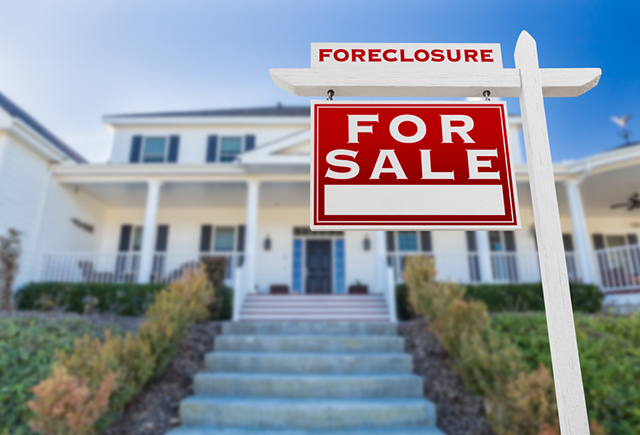With more than 60,000 properties nationwide entering foreclosure each month, finding an ideal home is just a matter of looking. In this article, we provide several tips on buying foreclosed properties.
Buying a foreclosed home requires an understanding of the process, as well as some preparation
First, a foreclosure is a legal process used by lenders to recover losses after a borrower stops paying. When it comes to mortgage loans, borrowers agree to lose their home if payments are not made. In general, failing to cover payments is referred to as defaulting on a loan.
After a default, the lending institution gains control of the property and a sale will take place to recover a portion of the loan. Usually, foreclosed properties are offered at a discount to comparable homes, giving prepared buyers an opportunity to purchase homes below market value.
Although, you should be aware these homes often have hidden costs. Remember a foreclosed home is being taken from someone who could not take care of it. Buyers have found that foreclosed homes are often damaged and in need of repairs.
Buyers who decide to purchase a foreclosed home should prepare for a lengthy process. Whereas a traditional home purchase is typically completed within 30 to 45 days. Buying a foreclosed property can take up to three times longer depending on how banks handle the process. Starting with an experienced broker and having a letter of pre-approval in-hand will smooth the process.
Investors should make it a priority to understand the terminology used in the foreclosure world
Learning the terminology is an important step when buying foreclosed homes. Any foreclosed homes is known as “distressed properties” by financial institutions and government agencies name.
There are several type of distressed properties based on factors such as ownership and sale conditions. For example, lenders often allow homeowners to sell a property for less than the amount owed on their mortgage. This process precedes a foreclosure, and is known as a short sale. In such cases, potential homebuyers are unable to ask for price reductions or contingencies. Short sales often happen when homeowners achieve negative equity, which means that they owe more than their home’s appraised value. Short sales can be good deals, but the process has significant setbacks. Most short sales take between 90 and 120 days to complete, as lenders will not approve a deal unless buyers meet all their demands, which often include repairs and closing costs.
Most foreclosures involve lenders taking control of a property. In such cases, foreclosed homes are known as REO, or real-estate owned. REOs comprise the majority of foreclosures, and are usually easier to purchase than short sales or auctions. REO sales often take no more than 90 days to complete, as lenders already have procedures in place. However, REO homes are often sold at prices matching nearby properties. People looking for a cheap home might have better luck with short sales or auctions.
If there is enough demand, lenders might put a house for sale at a public auction hasten the process. Public auctions are held by sheriffs or any local authority and often take place in courthouses, convention centers or at the property itself. Foreclosure auctions are all-cash deals, often paid with a cashier’s check. This can be a roadblock for people relying on financing to complete the purchase. Also, these properties may not be available for viewing or inspection before hand. In some cases, houses are still occupied when the auction takes place.
Some properties are owned by federal agencies such as the Federal Housing Administration, Fannie Mae, Freddie Mac or the Internal Revenue System. These houses are known as government-owned properties and require additional paperwork to be purchased. However, buying a government-owned house has additional benefits. For example, buyers might obtain financial assistance to complete the purchase. Other benefits might include relaxed payment schedules and low interest rates.
Prospective homeowners should seek a letter of pre-approval to determine borrowing limits and narrow the search
A letter of pre-approval serves two purposes. First, it helps borrowers get the paperwork ready for an eventual mortgage application. Second, pre-approval letters determine borrowing limits, which help narrow the search to only attainable properties.
To prepare a pre-approval, financial institutions will check credit histories, debt, annual income and payment records. If a borrower meets certain requirements, lenders will issue a letter pre-approving them for a mortgage loan. These letters are only valid for a certain amount of time, and do not guarantee that funding will indeed be received.
This is no different when the target property is a foreclosed home. In some cases, getting pre-approved might be more valuable when buying foreclosed properties because pre-approved homebuyers are often given privilege by real estate agents. Getting pre-approved from the property owner is also recommended.
Getting assistance from experienced brokers will smoothen the process of buying a foreclosed home
Financial institutions often hire a team of real estate agents to handle the sale of foreclosed properties. These professionals are also available to help potential buyers go through the process. However, they will always put the bank’s interests first. For this purpose, it is recommended hiring an experienced broker who is pursuing your interests only.
In general, people should look for professional brokers who are experienced in foreclosures. Although the process might be similar to purchasing a regular home, foreclosures have some procedures that differ. For example, each bank has its own rulebook when dealing with foreclosures.
Hiring an agent who has an existing relationship with the originating bank would help assure the purchase closes smoothly.
Despite the value of buying a foreclosed property. Buyers looking to buy a foreclosed home must understand they are dealing with institutions rather than individuals. This means every step of the process goes through several layers of approval before an agreement is reached. Foreclosures have little room for negotiation, and completing a purchase can take two to three times as much time as a regular purchase. Patience and attention to detail are key to succeed every step of the way.




